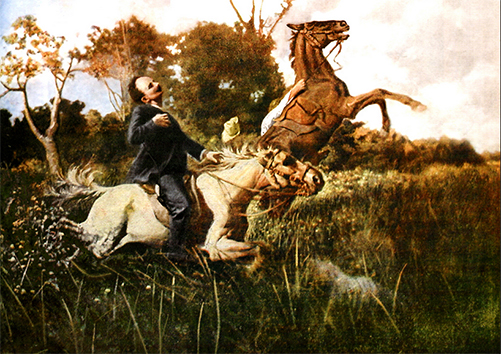
A few days before May 19, 1895, the Spanish Colonel Ximénez de Sandoval, who was in the Plaza de Palma Soriano, learned about the landings of Máximo Gómez, José Martí, Antonio and José Maceo and organized the operations to confront them with a strong column of Cuban cavalry, infantry and pilots.
He prepared an ambush in the eastern town of Dos Ríos, with his left flank protected by the Contramaestre River, on the right there was a thick forest and in front, where the only Mambisa troops could advance, was a wire fence that limited the charge the machete
The Spanish military leader also valued that the withdrawal to Remanganaguas, a town occupied by colonialist troops, was guaranteed.
In Dos Ríos, on May 19, 1895, Máximo Gómez prepared to confront the Spanish column that he believed was resting in the area and, according to anecdotes of the time, told Martí: “Get back, this is not your position".
The Apostle of independence did not comply with Gómez's indication, perhaps spurred on by his self-esteem, and he prepared to leave the camp and participate in the combat. He went out to the line of fire, on his horse Baconao, together with the young Miguel Ángel de la Guardia Bello.
Although Martí had not fought, he mastered the principles of military art and politics associated with conflicts, for which he studied the Napoleonic wars, the US secession war, and other important conflicts of the 19th century, and of course, carefully , that of the Ten Years and the causes of its failure and that of other subsequent attempts.
He considered it a political procedure, as he wrote in his article "Our Ideas" in the Patria newspaper on March 14, 1892, with which he shared the most advanced doctrine of the time on armed struggle developed by the Prussian theoretician Carl von Clausewitz, who defined that “war is the continuation of politics by other means”.
The Delegate of the Cuban Revolutionary Party put this root principle into practice in Cuba and, in order to prepare for the Necessary War, founded the Party in 1892, from which it multiplied into dozens of representations or clubs in Latin America, the United States and Europe that They were used for political work, but also to carry out conspiratorial actions and acquire resources.
With such convictions, he returned to his homeland and that May 19, he prepared to participate in the combat against the Spanish column. Upon reaching the top of a ravine, he stood in front of the peninsular infantry who shot him down with two fatal shots to the chest and the region of the neck and jaw.
The light of the Sun shone for the last time on the Apostle's forehead.Dismayed by the death of Martí, the Generalissimo said in a letter to Tomás Estrada Palma: “When I was aware of his fall, I did the best I could do, throw myself to see if he would pick up his body. It was not possible for me, and I can assure you that I have never been in so much danger. The news from a Spanish source that I was wounded was not without its foundation”.
The Cuban National Hero, shortly before his fall in combat, had written what is considered his political testament, in which he noted the need to "prevent Cuba from opening up, due to the annexation of the imperialists from there and the Spanish , the path, which has to be blinded, and with our blood we are blinding, of the annexation of the peoples of our America to the revolted and brutal North that despises them” (…) I lived in the monster, and I know its entrails; — and my sling is David's.
In a letter to his Mexican friend Manuel Mercado, he stated: “(…) I am already in danger every day of giving my life for my country, and because of my duty —since I understand it and I have the courage to do it— to prevent in time With the independence of Cuba, the United States may spread across the Antilles and fall, with even more force, on our lands in America.
"Everything I have done up to today, and will do, is for that. In silence it has had to be, and as if indirectly, because there are things that have to be hidden in order to be achieved, and if they were to be proclaimed for what they are, they would raise difficulties too great to reach above them the end."
In these times, when through enemy media campaigns on social networks, disrespect for Martí and national symbols is justified by some, while the Cuban social project is attacked, the Apostle's legacy is a strong handle to face such hoaxes.




